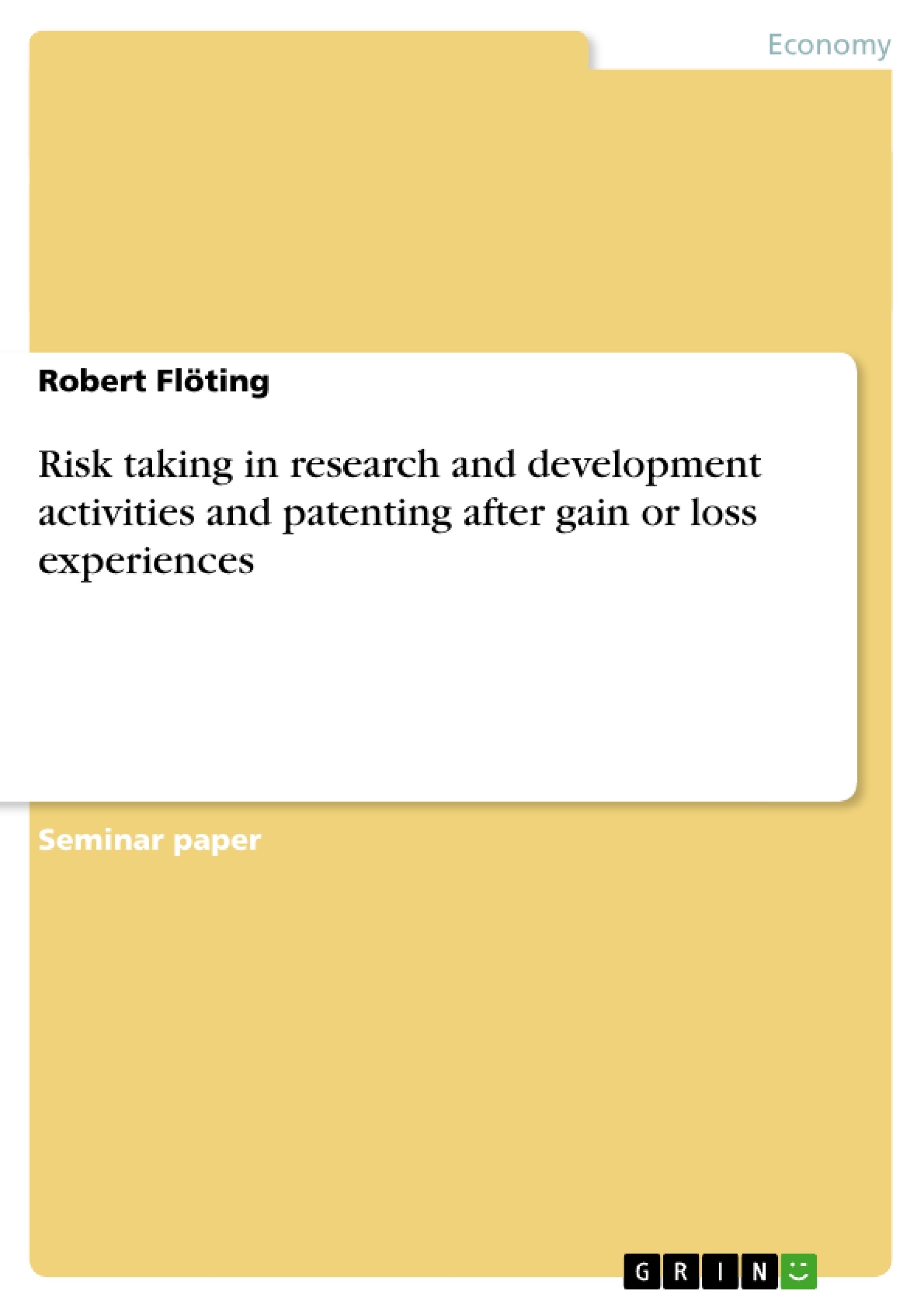1 Introduction
This seminar paper deals with the descriptive decision theory, which tries to show the actual decision behavior especially of ENTREPRENEURS. The question I particular examine is whether research and development activities and patenting is influenced by prior gain or loss experiences of entrepreneurs. This paper objective is to attain an empirically confirmation for this hypothesis. To make this possible I will turn out the evolutionary steps of strategic choice behavior models and show in an experimental study that prior gain or loss experiences have a considerable and significant impact on entrepreneurial risk taking and, as I will show later, as well on research and development activities.
2 Motivation
To examine entrepreneurial decision behavior under risk and after personal gain or loss experiences, we should take into account that research and development activities, in sense of developing a new product or product idea and the following placing of the innovation within the market, is obviously quite more risky then a `simple´ product-innovation. Empirical studies show that success of innovative product ideas is indicated by exceptionally low success probabilities about 3 – 5 %. (Perlitz / Löbler 1985, p 426) This gives an idea about the fact that research and development activities involve very high risks. If an Entrepreneur further chooses to patent the Innovation or the new product it produces additional costs and thereby increases the risk, because the potential loss if the venture fails is increasing as well. However, patenting is sometimes necessary to protect innovations against failure or to enlarge the possible outcome. But if entrepreneurs only accept increasing risks if there is an increasing expected gain as well, it raises a problem. The R & D activities involve high risks which reduce the expected profit and a small expected profit is not a very good reason for taking big risks. So what is the explanation for this phenomenon?
Inhaltsverzeichnis (Table of Contents)
- Introduction
- Motivation
- Definitions
- Explanations for Entrepreneurial Risk taking
- Agency Theory
- Expected Utility Theory
- Risk Return Paradox
- A Crisis as Incentive Constraint for Innovativeness
- Prospect Theory
- Reference Points and Aspiration Levels
- Mental Accounting
- Starting Points´ Effects on Risk taking Behavior
- Questionnaire Experiment
- Mode of operation of the Questionnaire
- Part A
- Part B: Certainty Equivalent
- Part C:The socio-demographic Part
- Evaluation of the Data
- Multinomial Logistical Regression
- Results
- Mode of operation of the Questionnaire
- Conclusion
Zielsetzung und Themenschwerpunkte (Objectives and Key Themes)
This seminar paper aims to explore the descriptive decision theory, specifically focusing on the decision-making behavior of entrepreneurs. The paper investigates whether prior gain or loss experiences influence entrepreneurs' decisions concerning research and development (R&D) activities and patenting. The objective is to obtain empirical evidence supporting this hypothesis by examining strategic choice behavior models and conducting an experimental study to demonstrate the impact of prior gain or loss experiences on entrepreneurial risk-taking.
- The influence of prior gain or loss experiences on entrepreneurial risk-taking behavior.
- The relationship between prior experiences and decisions regarding R&D activities and patenting.
- The role of strategic choice behavior models in understanding entrepreneurial decision-making under risk.
- The impact of risk and uncertainty on entrepreneurial decision-making in R&D activities and patenting.
- The application of empirical methods, such as questionnaire experiments and multinomial logistic regression, to analyze entrepreneurial decision-making.
Zusammenfassung der Kapitel (Chapter Summaries)
The paper begins by providing an introduction and outlining its motivation. It then defines key concepts such as innovation and risk, providing different perspectives and definitions from various sources. Chapter 4 delves into different theories explaining entrepreneurial risk-taking, exploring concepts such as agency theory, expected utility theory, risk-return paradox, prospect theory, mental accounting, and the effects of starting points on risk-taking behavior.
Schlüsselwörter (Keywords)
The paper focuses on entrepreneurial risk-taking, decision-making under uncertainty, R&D activities, patenting, strategic choice behavior models, gain and loss experiences, prospect theory, and empirical analysis using questionnaire experiments and multinomial logistic regression.
Frequently Asked Questions
How do prior gain or loss experiences affect entrepreneurial risk-taking?
Prior experiences significantly impact decision-making. According to Prospect Theory, entrepreneurs who have experienced losses may take higher risks to "break even," while those with gains might become more risk-averse or take calculated risks depending on their aspiration levels.
Why are R&D activities considered high-risk ventures?
Empirical studies show that the success probability for innovative product ideas is exceptionally low, around 3-5%. This makes research and development much riskier than simple product incremental innovations.
What is the role of patenting in entrepreneurial risk?
Patenting involves additional costs and increases the potential loss if a venture fails. However, it is often necessary to protect innovations and potentially enlarge the final outcome, creating a complex risk-return trade-off.
What is the "Risk Return Paradox" in entrepreneurship?
The paradox describes the phenomenon where high-risk R&D activities often have a small expected profit initially, which contradicts traditional utility theories where big risks should only be taken for big expected gains.
How does Mental Accounting influence business decisions?
Mental Accounting refers to how individuals categorize and evaluate economic outcomes. Entrepreneurs may treat "house money" (prior gains) differently than their core capital, affecting their willingness to invest in risky R&D.
- Citar trabajo
- Robert Flöting (Autor), 2005, Risk taking in research and development activities and patenting after gain or loss experiences, Múnich, GRIN Verlag, https://www.grin.com/document/71047



